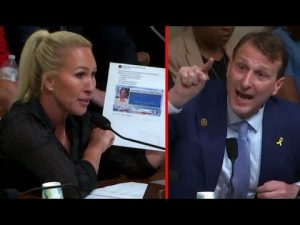In a lively and somewhat contentious hearing, the scrutiny of a controversial immigration case took center stage. The focus was on Kilmargo Garcia, a Maryland resident accused of being a member of the notorious MS-13 gang. This session had all the drama of a courtroom thriller, except it was taking place in front of Congress, a setting famous for its debates, arguments, and the occasional theatrical outburst. The real question at hand: should Kilmargo Garcia be deported or given a fair chance to defend himself in court?
The situation unfolded when one congressperson raised concerns over Garcia’s potential ties to MS-13, a group well-known for its violent reputation. According to claims made by the Attorney General and corroborated by local law enforcement, Garcia had been identified multiple times as affiliated with this dangerous gang. A Maryland gang unit, confidential informants, and even an immigration judge all seemed to agree that Garcia posed a significant risk. Yet the performance of this legislative hearing highlighted not just the facts of the case but the deep divides within the government regarding immigration and due process.
As discussions heated up, it became clear that there was a tug-of-war over the interpretation of evidence and the definition of due process. One side argued for the deportation of Garcia purely based on the accusations of his gang affiliation, while the other passionately defended his right to a fair hearing. A court order had deemed the need for due process, igniting a debate about whether or not the executive branch, which oversees immigration, had the authority to sidestep this fundamental governmental principle.
Criticism was directed at officials for allegedly cherry-picking facts and failing to adhere to legal requirements. As various members attempted to regain control over the conversation, interruptions flew around like popcorn in an air popper. With each claim that surfaced, the stakes grew higher, and the room simmered with tension. The underlying question remained: was the right to due process being overshadowed by the urgency to act against perceived threats?
In what might have seemed like a circus act, those present attempted to establish the relevance of court opinions, with one member reminding others that even judges, including one from the conservative Fourth Circuit, had emphasized the need for fair treatment in legal matters. While one congressperson tried to assert that a simple accusation did not equate to guilt, another called for immediate action based on the weight of the claims. This back-and-forth resembled a competitive tennis match, each side lobbing their arguments back with fervor, desperately trying to make their point land where it mattered most.
As the dust began to settle, the implications of this hearing became clear. It illustrated the broader national debate over immigration policies and the fine line between national security and individual rights. Garcia’s case became a symbol for many, encapsulating the struggle between the desire for safety and the necessity of justice. And now, it was up to the courts to decide who was right and who was fighting merely for a political point. On Capitol Hill, opinions may have clashed like gladiators in an arena, but in the end, all eyes were on the courts to determine the fate of Kilmargo Garcia and, with it, the future of immigration law in the United States.







